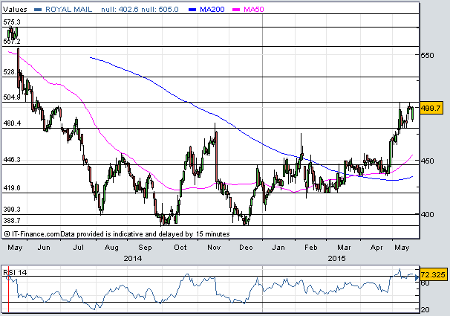Royal Mail stalls at big figure
21st May 2015 11:05
Are problems over at last? Well, a glimpse at these full-year results certainly suggests the situation is improving. Revenue edged up1%, operating profit before the parcel delivery firm's "transformation" costs rose 6%, adjusted pre-tax profit surged by more than a third, and the dividend goes up by 5%. Trading so far this year is in line with expectations, too. But while there are indeed positives here, conditions are tough and the shares will need a significant catalyst to break above stiff technical resistance at 500p.
Much of the profit boost came from lower finance costs, which more than halved to £30 million, and a £96 million reduction in transformation costs to £145 million despite more voluntary redundancies. "Our trading environment remains challenging, but we are now poised to step up the pace of change to drive efficiency, growth and innovation, while maintaining a tight focus on costs," said chief executive Moya Greene.
Costs at UKPIL (UK Parcels, International and Letters) were down 1% before transformation costs, better than expected - staff costs rose 1%, but non-people costs fell by 4%. And the sale of Royal Mail's Paddington site for £111 million helped halve net debt to £280 million.
But that cost performance was crucial, given that UK parcel revenue rose just 1%, offsetting a 1% decline at the letters business and leaving group sales flat at £7.76 billion. UK parcel volumes were up 3%, however, with a better performance in the second half, although letters fell by 4%.
And the market remains highly competitive. own delivery network is still expected to reduce the addressable market for Royal Mail by 1-2% a year short-term, and the annual letters market will shrink by 4-6% in the medium term. The transformation programme will cost £120-140 million each year, and lower bond yields will double the difference between the income statement charge and the cash cost to £255 million.
Royal Mail's European parcel delivery business GLS did well last year, but German minimum wage legislation and the sale of its DPD Systemlogistik subsidiary could cut margins there by 50-100 basis points this year.

(click to enlarge)
That said, Royal Mail has received welcome news in recent weeks - private equity arm LDC will now not invest in Dutch postal operator PostNL, and Whistl has suspended End-to-End (E2E) deliveries in London, Liverpool and Manchester. The latter "represents a turning point in Royal Mail's investment case," said Investec Securities this week.
"[This] should be seen as a clear signal that the long-term regulatory risk from protecting the universal service is uncomfortably high, and that this is very likely to dissuade other investors from entering the market as well," said the broker.
And Royal Mail shares have already done well, soaring by about 30% since December. It was a move Interactive Investor's technical analyst John Burford predicted could happen back in October and again in February.
"The next target is the November high at 470. Moving past that would set the next target at 500, which is the Fibonacci 50% retrace of the big wave down off the February [2014] high," said John. He was spot on!
Royal Mail currently trades on 15 times Panmure Gordon's estimates for March 2016 earnings per share (EPS) of 33.3p, and an enterprise value/operating profit multiple of less than 10 is a 15% discount to the sector average. There a prospective dividend yield of over 4%, too, although further cost cuts will have to drive earnings in the likely absence of revenue growth.
This article is for information and discussion purposes only and does not form a recommendation to invest or otherwise. The value of an investment may fall. The investments referred to in this article may not be suitable for all investors, and if in doubt, an investor should seek advice from a qualified investment adviser.
Editor's Picks